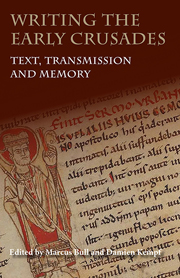Book contents
- Frontmatter
- Contents
- Acknowledgements
- List of Contributors
- List of Abbreviations
- Introduction
- Baldric of Bourgueil and the Familia Christi
- Guibert of Nogent, Albert of Aachen and Fulcher of Chartres: Three Crusade Chronicles Intersect
- Understanding the Greek Sources for the First Crusade
- The Monte Cassino Tradition of the First Crusade: From the Chronica Monasterii Casinensis to the Hystoria de via et recuperatione Antiochiae atque Ierusolymarum
- Nova Peregrinatio: The First Crusade as a Pilgrimage in Contemporary Latin Narratives
- What Really Happened to Eurvin de Créel's Donkey? Anecdotes in Sources for the First Crusade
- Porta Clausa: Trial and Triumph at the Gates of Jerusalem
- The Historia Iherosolimitana of Robert the Monk and the Coronation of Louis VI
- Towards a Textual Archaeology of the First Crusade
- Robert the Monk and his Source(s)
- Rewriting the History Books: The First Crusade and the Past
- The Ideal of Knighthood in English and French Writing, 1100–1230: Crusade, Piety, Chivalry and Patriotism
- Index
Introduction
Published online by Cambridge University Press: 05 May 2014
- Frontmatter
- Contents
- Acknowledgements
- List of Contributors
- List of Abbreviations
- Introduction
- Baldric of Bourgueil and the Familia Christi
- Guibert of Nogent, Albert of Aachen and Fulcher of Chartres: Three Crusade Chronicles Intersect
- Understanding the Greek Sources for the First Crusade
- The Monte Cassino Tradition of the First Crusade: From the Chronica Monasterii Casinensis to the Hystoria de via et recuperatione Antiochiae atque Ierusolymarum
- Nova Peregrinatio: The First Crusade as a Pilgrimage in Contemporary Latin Narratives
- What Really Happened to Eurvin de Créel's Donkey? Anecdotes in Sources for the First Crusade
- Porta Clausa: Trial and Triumph at the Gates of Jerusalem
- The Historia Iherosolimitana of Robert the Monk and the Coronation of Louis VI
- Towards a Textual Archaeology of the First Crusade
- Robert the Monk and his Source(s)
- Rewriting the History Books: The First Crusade and the Past
- The Ideal of Knighthood in English and French Writing, 1100–1230: Crusade, Piety, Chivalry and Patriotism
- Index
Summary
Whatever its substantive focus in any given instance and the particular problems that it is addressing, the study of the Middle Ages always comes down, sooner or later, to the study of the primary evidence that survives. As a scholarly discipline, medieval history requires sensitivity towards both the potentialities and the limitations of the source bases at its disposal, and a corresponding openness to new methodological and conceptual approaches that revivify the study of seemingly familiar, sometimes very familiar, materials. Our understanding of the numerous narrative sources inspired by the First Crusade (1095–1102), as well as of those texts influenced by the language, imagery, clichés and cognitive assumptions of crusading discourses over the course of the twelfth century and beyond, is a case in point. The richness and range of the narrative corpus relating to the First Crusade and the early crusade movement has been recognized since at least the time of Jacques Bongars's Gesta Dei per Francos (1611), while the systematic study of that corpus in the modern scholarly era may be said to have begun with Ranke's star pupil Heinrich von Sybel's Geschichte des ersten Kreuzzugs (1841). Studies of the narrative material have continued to appear, for example by Iorga in 1928, Hiestand in 1985, and Flori in 2010; and recently an interest has been emerging in the reception of some of these works as well as their social function as sites of memory.
- Type
- Chapter
- Information
- Writing the Early CrusadesText, Transmission and Memory, pp. 1 - 8Publisher: Boydell & BrewerPrint publication year: 2014



